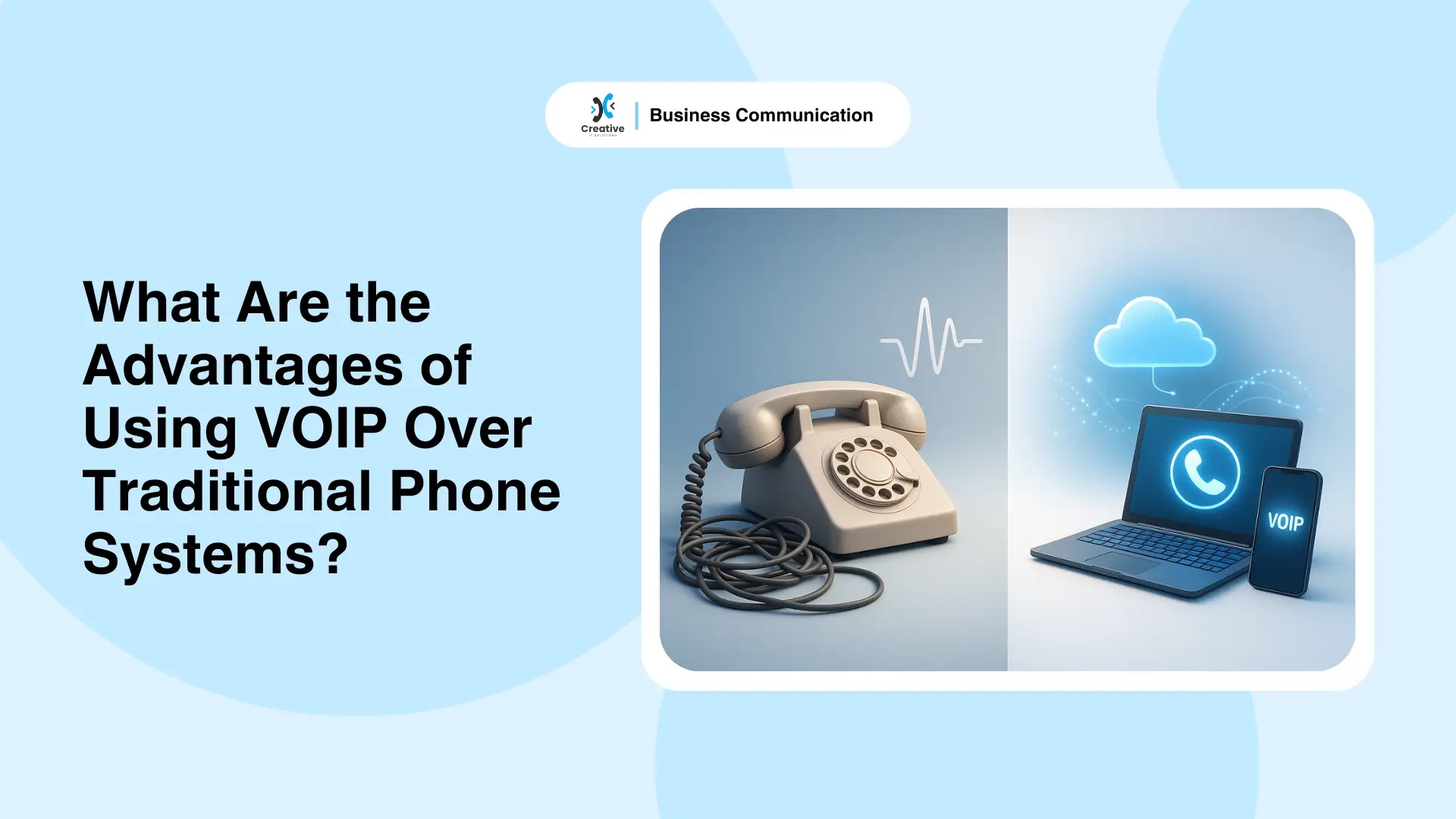What Are the Advantages of Using VOIP Over Traditional Phone Systems?

Business communication has changed dramatically in the past decade. Traditional phone systems that rely on fixed lines and heavy hardware are slowly being replaced by VOIP (Voice over Internet Protocol) – a smarter, faster, and more affordable solution that uses the internet to make calls.
Companies today need flexibility, mobility, and lower communication costs. That’s why many are shifting from landlines to cloud-based systems. The advantages of VOIP over traditional phones go beyond cheaper calls – VOIP offers advanced features like video conferencing, call recording, CRM integration, and analytics, all managed from one platform.
Whether you’re a small business or an enterprise, VOIP allows you to communicate from anywhere, scale quickly, and manage your team more efficiently. In this blog, we’ll explore the key benefits of VOIP and why it’s the preferred choice for modern communication.
Table of Content
ToggleUnderstanding VOIP and Traditional Phone Systems
To understand the advantages of VOIP over traditional phones, it helps to see how both systems actually work.
Traditional phone systems use copper wires or analog lines to transmit sound as electrical signals. Every call travels through a physical network owned by telecom operators. These systems require on-site PBX hardware, phone lines, and maintenance – making them costly and rigid, especially for growing businesses.
VOIP (Voice over Internet Protocol), on the other hand, converts your voice into digital packets and sends them through the internet. Instead of physical cables and switches, VOIP uses software and cloud servers to manage calls. You can make or receive calls using your laptop, smartphone, or desktop app – all connected through your internet connection.
Because VOIP runs on modern cloud technology, it offers more flexibility, scalability, and advanced features at a fraction of the cost. That’s why most businesses today see VOIP as a smarter, more efficient alternative to traditional phone systems.
In short, while traditional phones rely on hardware, VOIP relies on innovation – and that makes all the difference in how companies communicate today.
Key Advantages of VOIP Over Traditional Phones
Switching to VOIP gives businesses more control, lower costs, and smarter communication tools. Below are the major advantages of VOIP over traditional phones that make it the preferred choice for modern organizations.
Cost Savings and Lower Call Rates
One of the biggest benefits of VOIP is its affordability. Traditional phone systems require installation, maintenance, and separate charges for local, STD, and international calls. With VOIP, calls travel through the internet – which means you only pay for your internet plan or a low monthly subscription.
Businesses save up to 60–70% on communication costs, especially on long-distance and overseas calls, without sacrificing quality.
Flexibility and Remote Accessibility
VOIP allows you to make and receive calls from anywhere using a smartphone, laptop, or tablet. For teams working remotely or across time zones, this is a game-changer. Employees can log in to their VOIP app and stay connected without being tied to a physical office phone.
This flexibility is one of the clear advantages of VOIP over traditional phone systems, which depend on fixed wiring and desk phones.
Advanced Features and Integrations
Unlike old landlines, VOIP comes packed with modern tools that boost productivity. You can access call forwarding, call recording, voicemail-to-email, IVR menus, analytics dashboards, and even video conferencing – all from one dashboard.
Many VOIP communication systems also integrate with CRM and helpdesk software, helping businesses streamline customer support and sales operations effortlessly.
Scalability and Easy Setup
Traditional phone systems require extra lines and hardware whenever your team grows. VOIP scales instantly – simply add a new user in the dashboard and they’re ready to call.
Setup is quick and cost-effective because everything is managed through software or cloud servers. This makes VOIP ideal for startups and enterprises that need a communication system that grows with them.
Better Voice Quality and Reliability
Modern VOIP technology delivers crystal-clear audio and minimal call drops, provided you have a stable internet connection. Noise-reduction and bandwidth optimization ensure professional-grade clarity on every call.
In comparison, traditional phone lines often suffer from static or connection delays. The improved VOIP communication system guarantees smoother, more reliable communication for businesses worldwide.
By adopting these advantages of VOIP over traditional phones, businesses can reduce costs, boost productivity, and enjoy seamless collaboration across all devices.
Why Businesses Prefer VOIP Over Landlines
Modern businesses are moving away from traditional landlines because VOIP offers more flexibility, smarter features, and lower costs. Instead of relying on physical cables and on-site hardware, companies now use cloud-based VOIP systems that connect teams anywhere in the world.
With VOIP, employees can call, message, or host meetings directly from their laptops or smartphones. This cloud-first setup improves team collaboration – especially for remote and hybrid teams who need reliable communication across time zones.
Customer service is another major reason companies prefer VOIP. Features like auto-attendants, call routing, call recording, and CRM integrations help support teams answer calls faster and maintain consistent service quality. In contrast, traditional phones lack automation and make scaling support teams expensive and complicated.
The real advantage of VOIP over traditional phone systems lies in its adaptability. Businesses can add new users instantly, track call performance in real time, and manage everything through a simple dashboard. As work becomes more digital, VOIP gives companies the communication power and flexibility that landlines simply can’t match.
VOIP Security and Data Protection
As more companies switch to internet-based calling, VOIP security and data protection have become top priorities. Modern VOIP systems use multiple layers of protection to ensure that every call, message, and file shared over the network remains private and safe.
Most VOIP communication systems use encryption protocols such as TLS (Transport Layer Security) and SRTP (Secure Real-Time Transport Protocol). These technologies convert voice and data into coded information, preventing hackers or unauthorized users from intercepting your calls.
In addition to encryption, call authentication ensures that only verified users can join a call or access the VOIP dashboard. This prevents spoofing or impersonation – common risks in traditional phone networks.
Reliable VOIP service providers also include firewalls, VPNs, and continuous monitoring to detect and block suspicious activity in real time. Together, these features create a secure, end-to-end communication system that businesses can trust.
If your company handles sensitive data or customer calls daily, choosing the right VOIP service provider is essential to keep your communication protected and compliant.

Challenges of Traditional Phone Systems
While traditional phones have served businesses for decades, they come with several limitations that make them less effective in today’s fast-moving, digital environment. Compared to modern internet-based systems, the drawbacks of traditional telephony are hard to ignore.
1. High Costs and Maintenance
Traditional phone systems depend on physical wiring, PBX hardware, and separate billing for local and international calls. Installation, repairs, and regular maintenance add up quickly – especially for growing teams or businesses with multiple offices. VOIP eliminates these costs by running entirely on your internet connection.
2. Limited Flexibility
Landline systems tie employees to their desks. If someone isn’t near the office phone, they can’t make or receive calls. This lack of mobility doesn’t fit modern workstyles like remote or hybrid work. VOIP, on the other hand, allows users to stay connected from anywhere using their laptops or smartphones.
3. Poor Scalability
Adding new users or locations in a traditional phone system requires new hardware, cables, and sometimes even a full system upgrade. This slows down business growth and increases operational costs. VOIP systems scale instantly – you can add new users or numbers with just a few clicks.
4. Missing Modern Features
Landline phones only support basic calling. There’s no call analytics, video conferencing, or integration with CRM tools. VOIP brings all these advanced features in one cloud platform – boosting productivity and customer experience.
These challenges explain why many companies are choosing VOIP technology. The advantages of VOIP over traditional phones – from cost efficiency to flexibility – make it the smarter solution for modern business communication.
Related Post: VOIP vs Landline: Which Is Better for Small Businesses in India?
Real-World Use Cases: VOIP for Modern Businesses
The true advantages of VOIP over traditional phones become clear when you see how different types of businesses use it in daily operations. From small startups to large enterprises, VOIP has transformed how teams connect with customers and each other.
1. Startups – Affordable Communication from Day One
Startups often have limited budgets, but they still need professional communication tools. VOIP allows them to set up local or international numbers, manage calls, and collaborate online without heavy hardware costs. With features like auto-attendant, voicemail-to-email, and call recording, even small teams can deliver enterprise-level service.
2. SMEs – Better Team Collaboration and Customer Support
Small and medium-sized businesses use VOIP to streamline internal communication and customer service. Sales and support teams can log every call, track customer data, and share updates instantly through CRM integrations. This makes coordination faster and improves response time – something traditional phones can’t do.
3. Enterprises – Unified Global Communication
Large organizations use VOIP to connect multiple offices and remote teams under one platform. VOIP enables cloud-based communication systems where employees across countries can call, video conference, or chat securely using a single interface. This improves global coordination and cuts costs on international calling.
4. Remote and Hybrid Teams – Always Connected Anywhere
In the era of remote work, VOIP has become essential. Employees can make business calls from their laptops or mobile phones with their official numbers, no matter where they are. Cloud VOIP ensures consistent quality and availability, keeping teams connected 24/7.
Final Thoughts on Choosing VOIP Over Traditional Phones
As technology continues to evolve, businesses need communication tools that are flexible, affordable, and scalable. The advantages of VOIP over traditional phones are clear – lower costs, modern features, better call quality, and the freedom to work from anywhere.
Traditional phone systems simply can’t keep up with today’s cloud-based world. VOIP allows companies to connect employees, serve customers, and manage calls with ease – all through one secure, internet-powered platform.
Whether you’re a small startup or an established enterprise, switching to VOIP can transform how you communicate and collaborate. To get started, partner with an experienced VOIP service provider who can set up a reliable, secure, and fully customized solution for your business.
Make the move today – streamline your operations, reduce expenses, and experience the smarter way to connect.
Ready to switch from landlines to smarter communication?
Empower your business with advanced VOIP solutions that cut costs, improve flexibility, and keep your team connected anywhere.
At Creative IT Solutions, we help you migrate from traditional phones to a reliable, cloud-powered VOIP system - built for speed, clarity, and growth.
Frequently Asked Questions
Q1. Is VOIP cheaper than traditional phones?
Yes, VOIP is much cheaper than traditional phone systems. It uses your existing internet connection instead of separate phone lines, cutting installation and maintenance costs. Long-distance and international calls are also more affordable with VOIP – one of the biggest advantages of VOIP over traditional phones.
Q2. Can VOIP replace landlines completely?
Absolutely. VOIP technology can replace landlines for both personal and business use. You can make and receive calls using the same number across multiple devices – laptops, desktops, or smartphones – all through an internet connection. Many businesses have already moved fully to cloud-based VOIP systems.
Q3. What internet speed is needed for VOIP?
A stable internet connection with at least 100 kbps per call is ideal for clear VOIP audio. However, for HD voice or video conferencing, speeds of 1–2 Mbps per user are recommended. Consistent bandwidth ensures high-quality VOIP communication systems without delay or dropped calls.
Q4. Are VOIP calls secure for businesses?
Yes, when implemented properly, VOIP calls are secure. Modern VOIP systems use encryption protocols like TLS and SRTP to protect conversations from interception and unauthorized access. Partnering with a reliable provider ensures complete VOIP security and data protection.
Q5. What benefits does VOIP have over traditional telephone calls?
VOIP offers multiple advantages – lower costs, remote access, advanced features like call recording and analytics, and integration with CRMs or chat tools. These benefits make VOIP a more flexible and cost-effective option compared to landline phones.
Q6. What is the main disadvantage of VOIP?
The only limitation of VOIP is its dependency on internet quality. Without a stable connection, calls may drop or sound distorted. However, with a reliable broadband or 5G network, VOIP delivers far better quality and functionality than traditional phones.
